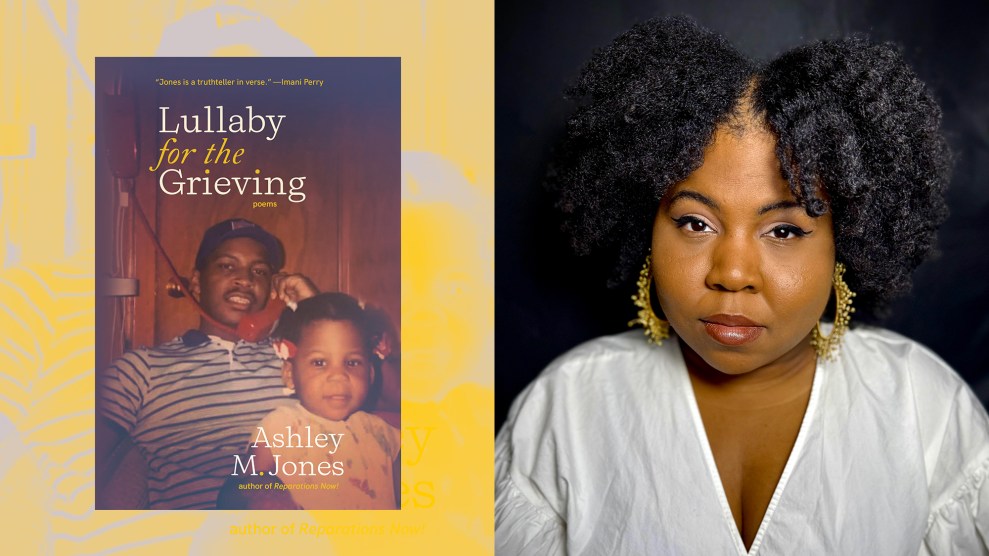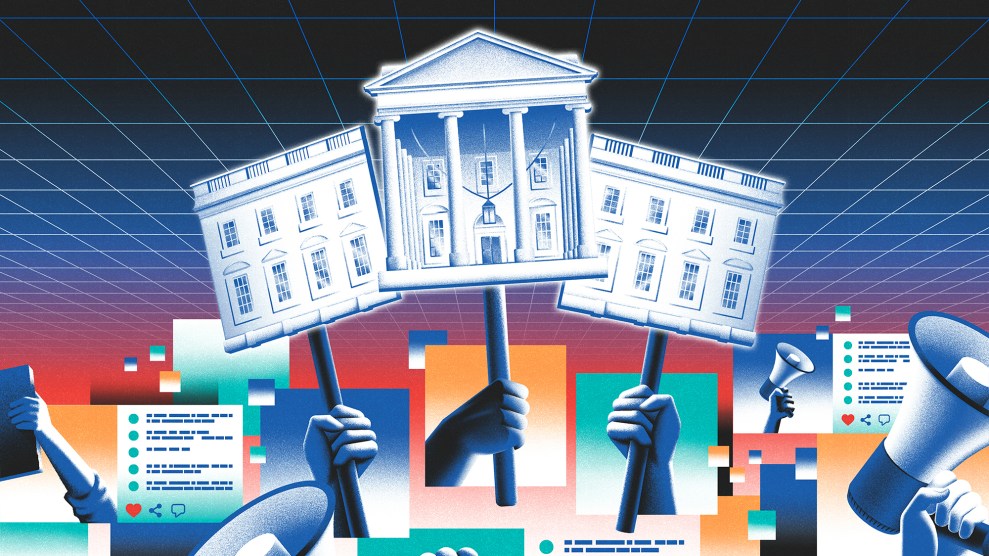
A few members of the crew at Columbia University's WKCR radio.Natalie Najar
Since last week, at Columbia University—as students have gathered to protest the war in Gaza and call for the university to divest from companies with ties to Israel’s military campaign—the college radio station, WKCR, has taken on a new role: near-constant news.
It has suspended its usual programming and doggedly covered the demonstrations on campus. And, after the administration called in police to break up the protesters, it has become an increasingly essential source of information on the protests for those outside Columbia, as the demonstrations gain prominence across the country.
Ted Schmiedeler, station manager at WKCR, and Georgia Dillane, program director at WKCR, have been in charge of handling the coverage over a fast-moving few days for the station. “We have a team of 19 people working on this right now,” Schmiedeler told Mother Jones. “And we have at least one person in the field at all times.” Last night, he said, he was that person for the night shift, reporting from 1 a.m. to 5:30 a.m. Dillane often stays in the studio, coordinating coverage among the many reporters.
We spoke with Schmiedeler and Dillane about the change in programming, explaining to your professors you’re skipping class to cover the protests, and how they have thought about the responsibility of covering the Columbia encampment.
This interview has been edited and condensed for clarity.
What has it been like these past few days?
Georgia Dillane: For lack of a better term, just hectic. We’ve been working around the clock. Essentially, every single person in this team of about 19 or 20 people have been on call since early Wednesday morning, April 17.
So, that means if you’re not actively reporting in the field, or in the station, you’re likely thinking about what’s happening. Or just in bed—maybe dreaming about it.
Ted Schmiedeler: Every person who’s working on this, all of our other obligations have completely fallen by the wayside. And we’re all putting in 14 to 18-hour days to bring this coverage to everyone.
Volunteer and unpaid?
Schmiedeler: Yep, volunteer and unpaid.
How did this reporting start for you all?
Schmiedeler: So we received a tip, and then immediately started preparing coverage. We were stationed in the encampment at 4 a.m., when it began on Wednesday, April 17. And we have had our whole apparatus in place since then.
And you’ve stopped all other programming?
Dillane: As soon as we received the tip, we knew right away that we were going to be covering it as long as it needed. And, at that point, we had no idea that we would even make it to Monday, April 22 (when we’re talking now). But it was very clear to us that we wanted to prioritize this.
If we feel any sort of lulls in reporting, or moments where we need to really just like need to collect our thoughts, we play music. But we’re treating [coverage of the encampment] as a preemption of regularly scheduled programming.
A good example: Today is Charles Mingus’ birthday—he’s a jazz bassist. And for the past handful of years we’ve been celebrating with 24 hours of just his music. And so, instead of sort of just a regular, somewhat random selection of music today, between broadcasting updates and coverage we’re playing his music.
WKCR continues to broadcast live updates on the developing situation at Columbia as we have been since approximately 5 am on Wednesday, April 17th, shortly after the initial CUAD emcampment began. Stay tuned for live updates via 89.9 FM and https://t.co/VbbKmfeHGg. pic.twitter.com/quUMTfdy1g
— WKCR-FM NY (@WKCRFM) April 20, 2024
How long do you think you can keep this up?
Schmiedeler: We can keep this up as long as the protests keep going.
Dillane: We certainly intend to. We’re making adjustments as we go. But I think everyone on the team knows that we’re going to keep going long as we need to cover it.
For those tuning in from the outside—who might not have been following this—what do you think the students are trying to say who are at the encampment? You’ve talked to a lot of people in the field.
Schmiedeler: I think they have three main demands, is what we’ve reported. They want divestment; amnesty for those who have been arrested and suspended; and then transparency about Columbia’s endowment.
Dillane: Those have been the demands from the beginning. But I think there’s also a second thing happening on campus right now. There’s an increased distrust and frustration with the administration for bringing NYPD onto campus. There’s just a lot of commentary about the NYPD: distrust and frustration about them entering campus for some; and then distrust and frustration about them not doing enough for others.
Can I ask you, because you guys have been covering this so intensely, as well intimately—some of these protesters are fellow students, who are your classmates. What is the outside media getting wrong?
Dillane: I’d say the biggest thing is the student perspective. Certainly, a lot of outlets are interviewing students. But I don’t think to the level that we are. That’s in part our ability to maintain trust. I don’t think we’ve been denied an interview by anyone on campus—and I think that just speaks to our unique position within the university.
Also, I think what some outlets are missing is just the intense discomfort with the atypicalness of what’s going on on campus right now. Like, particularly with swipe access—just like how strange that is on campus.
You’re students, too. What have been the most surprising moments for you both, especially with how the administration is handling this.
Schmiedeler: As a journalist, maybe the most surprising thing to me was when Public Safety asked us to vacate our space.
That was my next question: What happened with that?
Dillane: I was on air. And when you’re in the studio, you’re sort of in a zone. But what I remember is that I saw someone duck their head in—there are some screens in front of the microphones—and say Public Safety is here and they’re asking us to leave.
From what I understand after the fact—so, Lerner, the building where WKCR is held, they closed it early that day 9:30 p.m. But there’s a separate entrance, on street level, and that’s where we enter; there’s specific swipe access because we work 24/7 as a radio station.
So, we reported earlier that Lerner was going to close—but they in no way told us that we had to leave. Because anytime Lerner closes, we never have to leave.
So, or business manager and a couple other people were calling our advisor, who is our liaison with the university, and trying to get some clarity on that while the Public Safety officer was on the phone with a higher-up. And what ended up being the case was that it was a misunderstanding.
[Editor’s note: Public Safety did not respond to a request for comment.]
Schmiedeler: Public Safety has never asked us to vacate our space before. We’ve never been asked to leave. But they did clarify later. It apparently was a misunderstanding. But certainly, you know, a scary instance for us.
I think the most tragic part of the whole situation was that we lost about a good 45 minutes to an hour of field reporting. We don’t want to report on ourselves. We want to report on what’s happening on campus. So, when we have to get dragged back to campus because there’s a Public Safety officer telling us to vacate airspace, the ultimate tragedy is that we miss things out in the field.
How have you felt about the impact of this coverage? Do you feel like you’ve been doing something that’s been big?
Schmiedeler: Absolutley. We’ve had people reach out from a variety of mainstream outlets letting us know that they’re listening to us for live updates. We have heard from students from a wide spectrum of perspectives here on campus, thanking us for our coverage. We’ve had people tune in across New York City—people tune in across the country. What we’re doing, we think it’s really valuable.
What has been the hardest part of this work?
Dillane: We’re also juggling the fact that we are students—and having to communicate that to professors and other people we’re taking time to do this. That was challenging at the beginning. We hadn’t gotten the attention that we have now in the beginning. So, I think that was a little daunting—to make sure that I articulated accurately the weight of what I was doing so that they would understand that my time was needed and valuable here.
Schmiedeler: For me, I would say the most difficult thing has been kind of just fueling my body; getting out of bed. Because field coverage is really physically draining sometimes.
Dillane: I think I speak for a lot of the people here and that we’ve never done something like this to our bodies and to our souls. And so that has been something that has been challenging, just like understanding, like balancing the intense motivation we have to bring this coverage out into the world, but also recognizing that there are limits to what we can handle.















